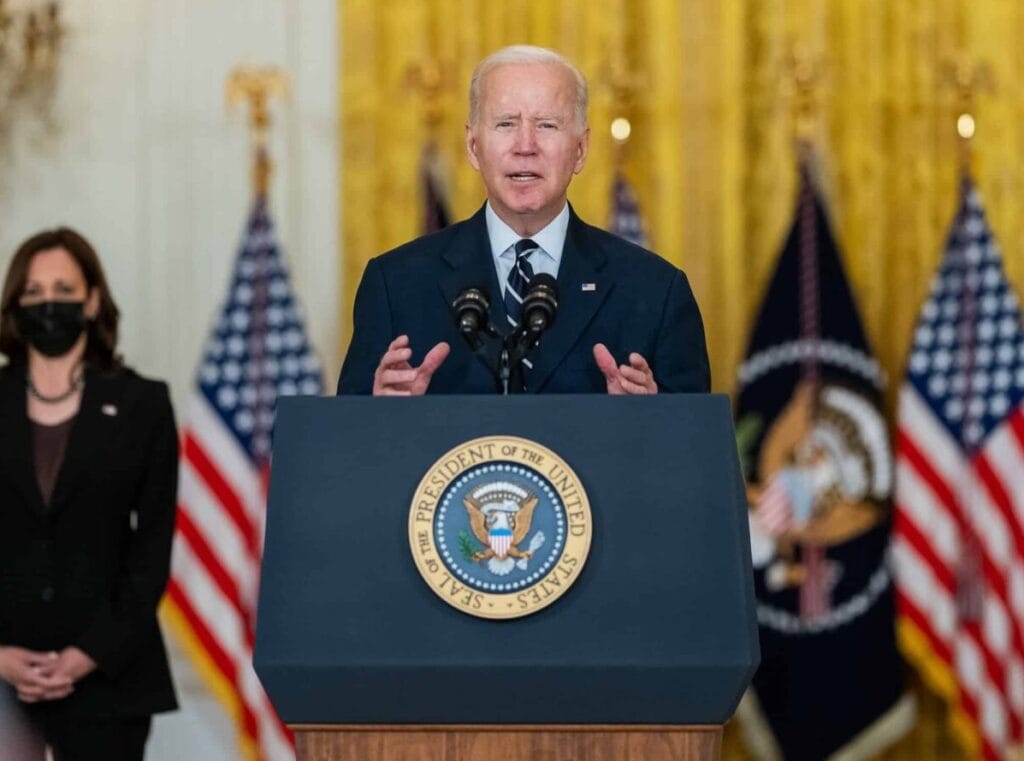House Delays Infrastructure Vote, Chinese Equipment Ban, Comcast Losses, Honoring Evan Kwerel
House Democrats delayed a vote on broadband infrastructure again, as $1.75 trillion reconciliation package brings greater party unity.

October 29, 2021 – House Democrats again delayed a vote on a bipartisan infrastructure package Thursday after initially planning to vote that day.
Members of the House Progressive Caucus have refused to commit towards supporting the infrastructure bill amid changes made to President Joe Biden’s separate $1.75 trillion reconciliation framework designed to please centrists Sen. Kyrsten Sinema, D-Ariz., and Sen. Joe Manchin, D-W.Va.
On Thursday, Biden came to Capitol Hill and spoke before the House Democratic Caucus. He introduced the new reconciliation package, which is pared down from earlier versions that included $3.5 trillion for social spending measures.
The $1.2 trillion infrastructure bill includes $65 billion for broadband spending. Although the infrastructure measure itself has not proved controversial, House passage has been held up as progressives have demanded a vote first on the reconciliation framework. In August, the infrastructure bill passed the Senate by a strongly bipartisan vote of 69-30.
Hence the fate of broadband spending is tied up in the debate about other social spending.
Although Sinema has not voiced her view the new Biden-endorsed reconciliation package, Manchin punted on whether he would ultimately support its new $1.75 trillion price tag.
“This is all in the hands of the House right now,” Manchin said to reporters.
Biden stressed that House and Senate majorities, as well as his presidency, could be determined by the House’s actions with regards to the infrastructure bill.
Chinese Equipment Ban
Reps. Anna Eshoo, D-Calif., and Steve Scalise’s, R-La., bipartisan Secure Equipment Act of 2021 passed the Senate unanimously Thursday.
The bill prohibits the Federal Communications Commission from “reviewing or issuing new equipment licenses to companies on” its list of companies that it considers to pose a national security threat.
The act was helped through the Senate by Sens. Marco Rubio, R-Fla., and Ed Markey, D-Mass., who had introduced a similar bill to the Senate in May.
“Our bipartisan legislation will prevent China from infiltrating America’s telecommunications networks and compromising our national security,” said Scalise.
Companies whose equipment would be restricted form further marketing in the United States as a result of the bill include Huawei, ZTE, Hytera, Hikvision and Dahua.
Declining Comcast Video Subscriptions
Comcast’s accelerated rate of video subscriber loss has continued into the third quarter.
During the quarter, the company’s video subscriber base shrunk by 408,000. The figure comprises 382,000 residential and 26,000 business video subscriber losses. Comcast’s total subscriber base now stands at 17.84 million and 705,000 business subscribers, contributing to a nearly 1.3 million total subscriber loss this year.
Despite subscription losses, Comcast raised its video revenues by 1.4% to nearly $5.5 billion in the quarter as a result of increases in average rates.
Comcast overall cable communications revenues rose 7.4% to $16.1 billion with the addition of 300,000 internet customers as well as higher revenues for wireless, business services and advertising.
Earnings were highlighted by NBCUniversal’s $10 billion in revenue, a 57.9% increase amid economic recovery for its studios and theme parks.
Honoring Evan Kwerel
On Thursday, Federal Communications Commission Chairwoman Jessica Rosenworcel sent congratulations to Evan Kwerel, senior economic advisor in the FCC’s Office of Economics and Analytics, for his receipt of the Paul A. Volcker Career Achievement Medal.
Kwerel helped to create the FCC’s spectrum auction system, which he first suggested in 1985. In 1993 after Congress gave the FCC the authority to conduct auctions, Kwerel helped develop the rules and design for the auction process.
“You can’t properly tell the story of spectrum auctions without talking about Evan Kwerel,” said Rosenworcel.
The FCC has completed over 100 auctions since its first in 1994, adding more than $200 billion to the U.S. Treasury and creating more than $1 trillion in benefits for the American public.










